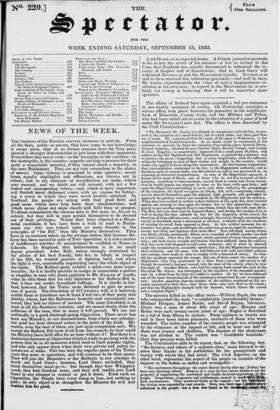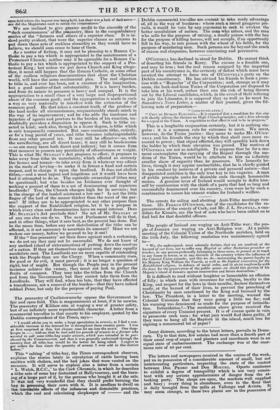The affairs of Ireland have again acquired a bad pre-eminence
in our weekly summary of events. On Wednesday sennight,. a serious affray took place between the peasantry in the neighbour- hood of Doneraile, County' Cork, and the Military and Police, who had been called out to assist in the valuation of a piece of land under Mr. STANLEY'S new Act. The affray is thus described by the Cork Constitution- " The Reverend Mr. Gavin was obliged, in compliance with the law, to pro- ceed to the valuation of a small district, out of which tithes had been paid time out of mind. We understand that the name of the place is Wallstown, in the neighbourhood of Castletownroche. As no doubt could be entertained of the intention to prevent by force the valuation from taking place, General Barry, General Annesley, Admiral Evans, Garrett Nagle, Brazier Creagh. and George B. Low, Esquires, as magistrates, appeared with a small party of police, and soldiers of the 92d Highland and 14th Regiments, to protect the valuators, and to preserve the peace—supposingthat so many magistrates, with the influence ordinarily belonging to men of their station and weight in the country, would render any appeal to force altogether unnecessary. In this humane supposition, they were mistaken—resistance to the law, to the Magistrates' authority, and to the force ready to sustain both, was determined on, and it was persevered in, in contempt of reiterated remonstrances. As soon as the Magistrates appeared, a farmer of the name of Doyle, one of those who do not live to repent of their temerity, according to some accounts, assured them in coarse and strong terms, that he would oppose any attempt to enter on his farm with open force • and upon the Magistrates proceeding to cover with their authority the proceedings of the valuators, the signal was given liy Doyle, and, with a surprising celerity, crowds showed themselves upon the adjacent high grounds, and proceeded to approach the position which was occupied by"the Magistrates and the military. When they had reached to within a short distance of this spot, they were warned against any attempt to close upon the troops; but to this admonition they ap- peared to pay no other regard than to cast stones, which they did with some effect. The Riot Act was then read by General Barry; and during the reading of it, as well as during the time allowed by law for the dispersion of the crowd, the throwing of stones did not cease ; until at length, the crowd, though continuing the assault as described, made a movement in advance, evidently with the intention of resisting the small body opposed to them. At this critical moment, the al- ternative was plain, and accordingly the order was given to repel the assailants— twenty men fired, and nineteen shots took effect. Four fell dead, among whom was Doyle, already mentioned ; fifteen were wounded, of which number one died in a short time. After this, the crowd, which consisted of many thousands, gave way; and such severe wounds and bruises had been inflicted upon the soldiers, that they were well disposed to take some summary, and it must be allowed under the circumstances, excusable satisfaction ; but the Magistrates interposed their authority, and the men, who had behaved with such unrivalled coolness and courage, were ready at once to comply with a demand of mercy. So close did the assailants approach the troops, that one of them seized the musket of a Highlander who was prostrated by a blow from a stone, and carried it off, though he received a bayonet wound, into the mass of the crowd, where he was lost sight of. Another fellow, who had his reaping-hook round the neck of the Reverend Mr. Gavin, was intercepted in the execution of his intended murder, only by a blow from the butt of a soldier's musket. So far we have followed one of the most circumstantial of the statements transmitted by our correspond- ents : another mentions that the number of the military employed on this oc- casion amounted to forty-five; that thirty shots only were fired in the whole; and that the Highlanders charged with the bayonet, which threw the crowd into a complete flight."
The persons killed in the affray were—William Doyle, the man who commanded the mob, " a comfortable [considerable] farmer ;" Michael Horgan, James Roche, and David Regan, labourers. Doyle was a man of about fifty years of age ; Horgan and Roche were each twenty-seven years of age; Regan is described as a lad of from fifteen to sixteen. From eighteen to twenty are said to have been taken prisoners, exclusive of those who were wounded. The entire number of the country people was estimated by the witnesses at the inquest at 300, and at least one half of them were women and children. The disaster of the clergyman was not alluded to. The verdict was " Justifiable homicide:' Only four persons were killed. The Constitution adds to its report, that on the following day, "the farmers, and others of a superior class," came forward to ex- press their thanks to the authorities for the promptitude and energy with which they had acted. The Cork Reporter, on the other hand, represents the aspect of the people on occasion of the inquest on the bodies as sullen and revengeful- " The excitement throughout the entire district during this day [Friday] has been very alarming indeed. Motives of a very obvious nature dictate to me the propriety of suppressing the uncloaked and loudly-declared expressions of the people. Desperation, vengeance, and recklessness, seemed to marlrakTri Wit+ , dark countenances. They mustered thinly at the inquest ; but the Innerals'of `Ni the victims were attended by vast crowds. Here, too, there was liettled-dowiVse sullenness in the people; not a kern was heard as the candaalls‘, pawedthe:A* 4,
open field where the inquest was being held, but there was a look of dark scorn—, .or did the Magistrates omit to notice the circumstance."
We are inclined to give greater credit to the sincerity of the "dark countenances" of the peasantry, than to the congratulatory smiles of the "farmers and others of a superior class." It is in- deed pretty evident, that were the superior classes as anxious to put down these acts of reckless absurdity as they would have us believe, we should soon cease to hear of them.
As a matter of feeling, it may not be pleasing to a Roman Ca- tholic to pay a tax which is appropriated to the maintenance of a Protestant Church; neither may it be agreeable for a Roman Ca- tholic to pay a tax which is appropriated to the support of a Pro- testant King; but unless we put down Church and King altoge- ther, it must still happen that the Roman Catholic, or some other of the endless religious denominations that share the Christian world, will have the same sentimental plea. The real objection to tithe is, and ever has been, not a creature of the imagination, but a good matter-of-fact substantiality. It is a heavy burden, and from its nature its pressure is heavy and unequal. It is the appropriation to a small class of a very large and disproportioned share of the common good; and the appropriation is made in such a way as very materially to interfere with the extension of the common good. He that takes a constant tenth of the produce of the land under all circumstances, unquestionably stands much in the way of its improvement; and he who adds the insolence and injustice of agents and proctors to the burden of his exaction, un- doubtedly provokes a disposition to oppose it. Such is tithe ex- acted in kind; such also, though in a lesser degree, is tithe which is only temporarily commuted. But once commute tithe, entirely, or for a long period of years, and tithe becomes indistinguishable from any other general tax. It may still be offensive—so, with the unreflecting, are all direct taxes; it may still be burdensome —so are many taxes both direct and indirect; but it ceases from that moment to possess any peculiarity of offensiveness or weight. This is what Mr. STANLEY'S Act proposes to effect; it proposes to take away from tithe its uncertainty, which affected so seriously the farmer and tenant—to take away from it whatever was odious in the mode of levying—to make it in future a fixed and certain impost, and to charge it upon the landlord. It does not abolish tithes,—and a most unjust and iniquitous act it would have been had it attempted to do so. The equitable ownership of tithes may be questioned; but who besides an Irishman ever thought of making a present of them to a set of domineering and rapacious landlords? True, the Church charges high for its services; but is the charge of the landed aristocrat a low one? Is not the little finger of the lord of the manor thicker than the waist of the par- son? If tithes are to be appropriated to any other purpose than the support of the Established religion, let it be a purpose in which every class and denomination have an equal interest. Does Mr. STANLEY'S Act preclude this? No act of Mr. STANLEY Or of any one else can do so. The next Parliament will do in that, and in other things, what it sees best, as the present has done. But in the mean time, before any new distribution of the tithe can be effected, is it not necessary to ascertain its amount? Must we not reckon our money, before we proceed to lay it out?
If the " fine peasantry" set their faces against such a reckoning, we do not say they may not be successful. We do not know of any method (short of extermination) of putting down the resolves of a nation. If they set themselves against rent, they may equally annihilate rent. The Landlords are no more capable of contending with the People than are the Clergy. When a community rises, for good or for evil, it must prevail ; it is no longer a question of right, but of might. But though the People may in the present instance achieve the victory, they must not look to gather the fruits of conquest. They may take the tithes from the Church and from the Government, but they cannot take them from the Landlords. They will find, when too late, that they have effected a transference, not a removal of the burden—that they have indeed robbed Peter, but only for the purpose, of paying Paul.



























